2021-08-11 Park Seong-jin, Auckland Trade Center, New Zealand
go. industrial characteristics
Information and Communication Technology (ICT) Industry Status
New Zealand, which has a weak manufacturing industry, is highly dependent on imports from abroad. In New Zealand, the ICT industry is recognized as a new growth engine and is expected to grow greatly with government support. New Zealand ICT market is divided into computer services based on information processing technology and communication services using communication technology. In addition, the computer service field is divided into system design, data processing, web-based service, and data storage service, and communication service is divided into Internet and web portal service, operation of wired and wireless network system, and telephone service.
[New Zealand Information and Communication Market Classification]

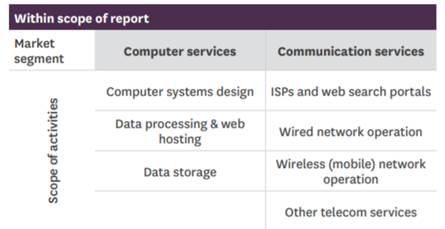
Source: Westpac Bank NZ Information and Communication Market Report (2020.08/XNUMX)
The government recognizes ICT-related technologies as core technologies that will lead the 4th industrial revolution. In particular, government-level investment in high value-added innovative industries using ICT and companies are actively entering the field. high.
Innovative ideas based on software and research on convergence between humans and things (products and facilities) through information and communication technology (ICT) are also being actively conducted. It is in the spotlight and is recognized as a market that creates new economic value. The e-commerce market is also growing significantly as Ontekt marketing and non-face-to-face commerce have been activated due to the recent impact of COVID-19, and related companies' investment in ICT systems to support this is expected to increase.
New Zealand ICT Industry Policy
The New Zealand government announced the Digital Technology Industry Transformation Plan (June 2019.6) to promote industry innovation based on digital technology. This project, jointly promoted by MBIE (Employment Innovation MOTIE) and New Zealand Technology Association (NZ Tech), aims to upgrade the competitiveness of the entire industry to the next level through ICT-based innovative technology.
To this end, a review of 1 domestic IT-related companies that will have an impact on the industry’s digital technology transformation was conducted. A dollar amount of money is being invested in the business. According to the New Zealand Employment Innovation MOTIE's report on the progress of digital technology transformation (Aug. 3000), the final investment of US$ 2 million is expected to include public capital and private investor procurement.
[New Zealand digital technology industry transformation plan]
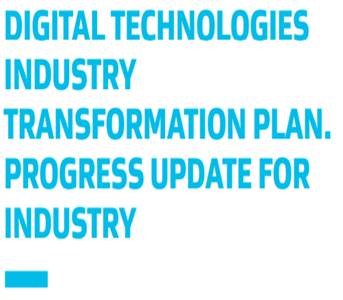
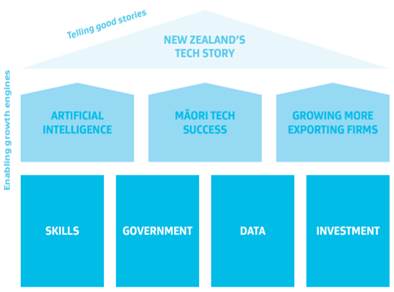
Source: New Zealand MBIE (Employment Innovation MOTIE 2020.8)
New Zealand, which has a weak manufacturing industry, is concentrating on fostering technology-intensive innovative industries using ICT-related software and hardware with the goal of strengthening competitiveness in the 4th industry. In addition, the government is establishing a procurement policy for nurturing ICT-related technical manpower and supplying hardware and solutions necessary for digital technology transformation. In addition, various databases that the government has been accumulating are disclosed to various SMEs based on the open data policy, and AI (artificial intelligence) technology and human resources development is being promoted.
The government aims to increase corporate R&D investment and expenditure to 2028% of GDP by 2. Many companies are using it.
Latest technology trends and major issues
(Demand for mobile communication technology related to 5G) In New Zealand's telecommunication market, Vodafone, Spark, and Two Degrees three mobile network operators (MNOs) occupy more than 3% of the mobile telecommunication market. The remaining 99% is occupied by mobile virtual network operators (MVNOs) such as Warehouse Mobile and Vocus. According to the New Zealand Chamber of Commerce, as of December 1, the number of local mobile subscribers was about 2019 million, with Vodafone having the highest market share with 640 million, followed by Spark with 260 million subscribers. appeared to be
In particular, 5G technology is a core technology that processes large-capacity data in real time for the realization of advanced technologies such as autonomous driving, smart city, smart factory, and smart farming as the foundational infrastructure of the 4th industrial revolution. Since Vodafone launched its first pilot service in 2019, Spark also launched its service at the American Yacht Cup held in Auckland in 2020 and is in the process of spreading it nationwide. In this process, South Korea's Samsung Electronics signed a contract to supply 5G mobile communication equipment with Spark of New Zealand and is promoting the spread of 5G service using next-generation communication technology with Spark.
[New Zealand 5G service]


Source: Vodafone NZ (https://www.vodafone.co.nz), Spark (https://www.spark.co.nz/) website
Vodafone, the No. 1 player in the number of subscribers, received equipment from Ericsson, a Swedish telecommunication equipment company, to commercialize 5G services, and started commercial trial service in December 2019 for the first time in New Zealand. In New Zealand, various technological innovations are expected based on 5G networks in the future. In particular, experiments to maximize automation and connectivity such as autonomous driving equipped with artificial intelligence, drones, and virtual/augmented reality are also being conducted. is expected
(Fintech - Fintech technology) Fintech, a compound word of finance and technology, is a term that refers to the integration or convergence of finance and technology. Fintech has recently been attracting attention as a new growth engine for the financial industry in New Zealand. In particular, the integration between financial and non-financial services using ICT such as embedded finance is accelerating. Amid these changes, the fintech platform is recognized as an innovative solution that can support more flexible and wider options for customers using financial services.
According to Callahan Innovation, a government agency that supports the development of innovative technologies, there are about 170 Fintech-related companies in New Zealand. In particular, in the Fintech industry, most of the services provided through documents and face-to-face must be replaced with online-based ICT, so the demand for ICT technology is very high.
[Status of startups entering Fintech and e-commerce]
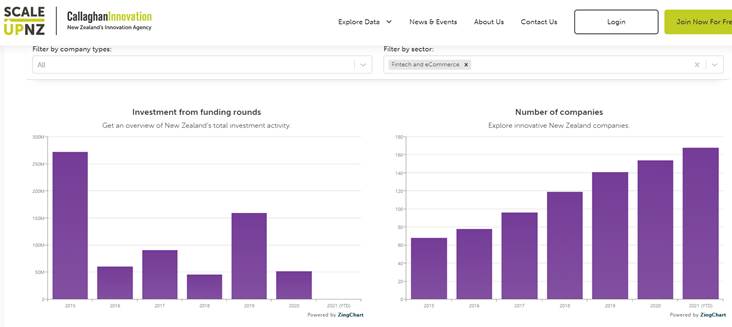
Source: Callaghan Innovation Center
(Innovative technology convergence based on ICT in agriculture) New Zealand, where the primary industry is developed, is sensitive to changes in the latest technology in the agricultural field, and is particularly interested in fostering new industries related to Agritech through the convergence of agriculture and ICT, such as smart farm. In particular, in the field of precision agriculture, the application of new technologies such as AI is being prepared, and the 1G communication network is expected to be used as a core infrastructure for real-time transmission of such large-capacity data and sharing of analyzed results between devices. IRIS DATA SCIENCE, a New Zealand IT company, is an innovative company that implements various analysis and prediction models using Big Data, and has also developed the world's first technology to identify the face of a sheep.
[ICT used in AgTech]

Source: New Zealand Agtech company Gallagher website (https://www.gallagher.com/)
ICT field company status
New Zealand ICT-related companies have 1 computer and communication service providers, while there are 3000 companies that manufacture related products (hardware), which is a small number compared to service providers.
[Number of Companies and Employees by ICT Industry in New Zealand]
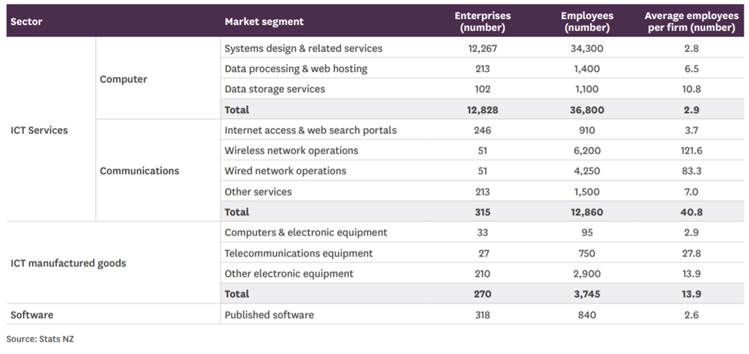
Source: Statistics Korea, Westpac Bank NZ Information and Communication Market Report (Aug. 2020.08)
DATACOM is a representative ICT company. DATACOM is a New Zealand IT system integration and related consulting company, providing new IT system construction and maintenance services to local companies in Auckland and Wellington. DATACOM is not only in New Zealand, but also in Australia and Asia, providing pre-consulting and ICT system integration and maintenance services required for system construction. According to DATACOM, sales in 2019 amounted to US$9 million, an increase of 17% compared to the previous year, positioning itself as the No. 1 company in the field of IT system construction in New Zealand.
[New Zealand IT system construction company DATACOM]

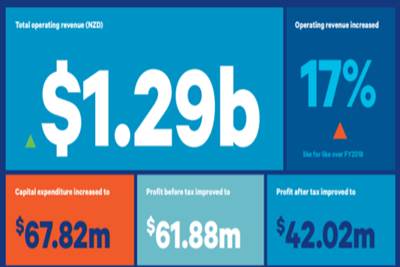
Source: DATACOM Annual Report 2019
Gallagher is one of the leading companies in the agricultural agtech sector. Gallagher, with its strengths in smart farm technology and security (access control), is a representative indigenous Agtech company that develops various solutions related to livestock management and hardware in the field of access control in New Zealand, where dairy farming is developed.
[About Gallagher Group]

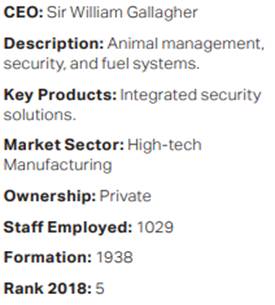

Source: 2020 New Zealand Agtech Insights Report
me. Industry supply and demand status
ICT industry import/export and investment status
According to Westpac Bank 2020 New Zealand ICT Industry Report, ICT-related imports in 2019 amounted to US$47 billion, and most of the imported products were ICT-related hardware equipment. In particular, overseas manufactured personal computers and servers, and various mobile communication equipment and parts for maintenance accounted for a high proportion. Others appeared as communication services for computer system design, data processing and web hosting. Exports amounted to US$19 billion, which is a small amount compared to imports, but it is equivalent to New Zealand wine exports and has maintained steady growth since 2000.
[2019 New Zealand ICT-related trade scale]

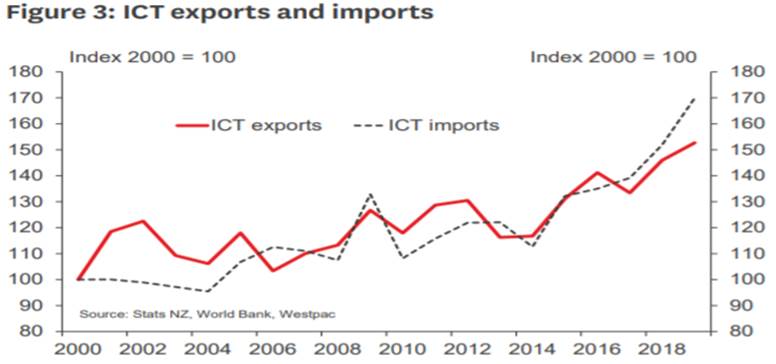
Source: New Zealand Statistics Korea, Westpac Bank ICT Industry Report
New Zealand provides global companies with an excellent location as a test bed for ICT-related products, and foreign companies for software testing are actively entering the country. Representative investment companies include Rocket Lab of the United States, which invested in New Zealand to test software embedded in hardware such as spacecraft and automobiles, and the HMI Lab of Volvo Cars.
In addition, Google, a world-renowned IT company, also tested an Internet service system using an organization called Google Loon, and Facebook and LinkedIn made beta betas before distributing new features worldwide. I even ran a test. Microsoft also announced plans in May 2020 to set up a data center in New Zealand for its cloud services aimed at businesses.
[Overseas investment in New Zealand innovative technology industry]
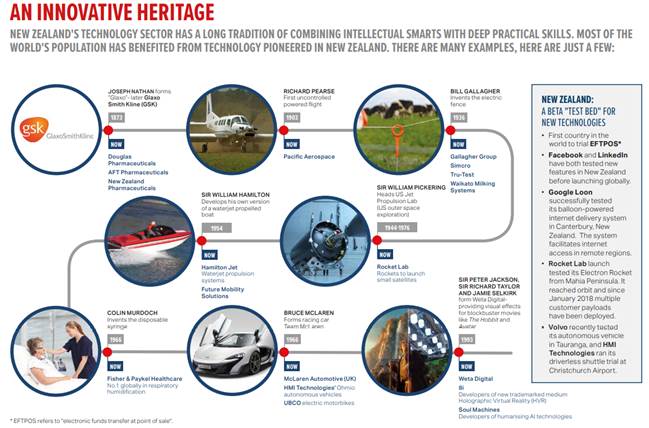
Source: TIN NZ Technology sector guide
all. entry strategy
□ SWOT analysis

Promising field
New Zealand has not developed high-tech industries such as automobiles and home appliance manufacturing, while industries that process and export good raw materials through primary industries such as forestry and dairy farming have developed. Recently, interest in the smart factory field has increased, and specialized companies that supply factory automation, robotics, and conveyor systems are emerging. New Zealand's global dairy exporter, Fonterra, built an overseas dairy production plant in the Netherlands and built an automated plant using the technology of Milwaukee-based Rockwell Automation, USA. Demand for related technologies is expected to increase steadily.
While the demand for ICT technology in the smart farm sector is also expected to be high, the export of dairy products to New Zealand has been brisk despite the aftermath of COVID-19. According to the IT person in charge of a local company specializing in the field of Agtech, AgTech is a field that creates new added value by combining traditional primary industries and ICT-based new technologies. It is transforming simple machinery and facilities into automated smart equipment using
In 2020, the New Zealand Tech Road Show (November 11.23) was held, hosted by the New Zealand Chamber of Commerce in Korea and Gyeonggi Province. New Zealand, which strives to foster innovative industries, is making steady efforts to lead export growth in the high-tech sector every year. New Zealand's ICT industry is a major demand for Korea's excellent software and hardware development technology in the information and communication field, and it is a field in which many Korean companies are expected to advance and cooperate.
Source: New Zealand Statistics Korea, Westpac Bank 2020 NZ Information and Communication Market Report, related company website, MBIE (Employment Innovation MOTIE) ICT related data, KOTRA Auckland Trade Center’s own collection information



